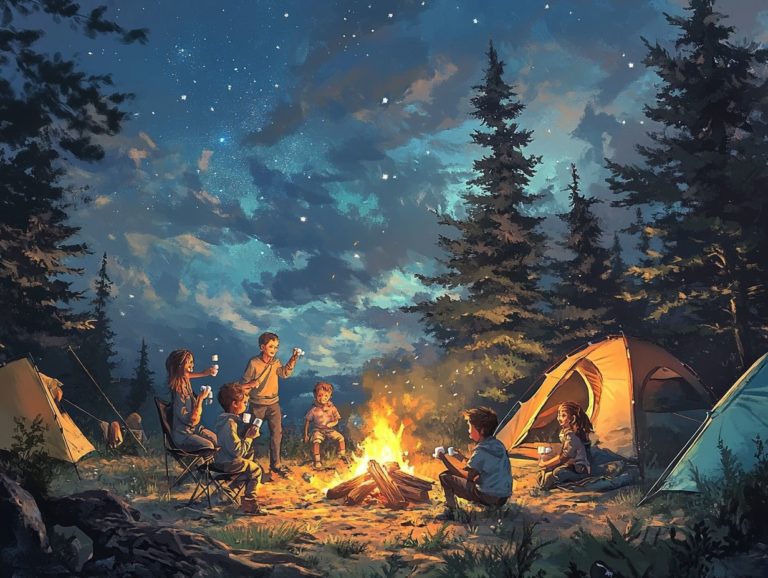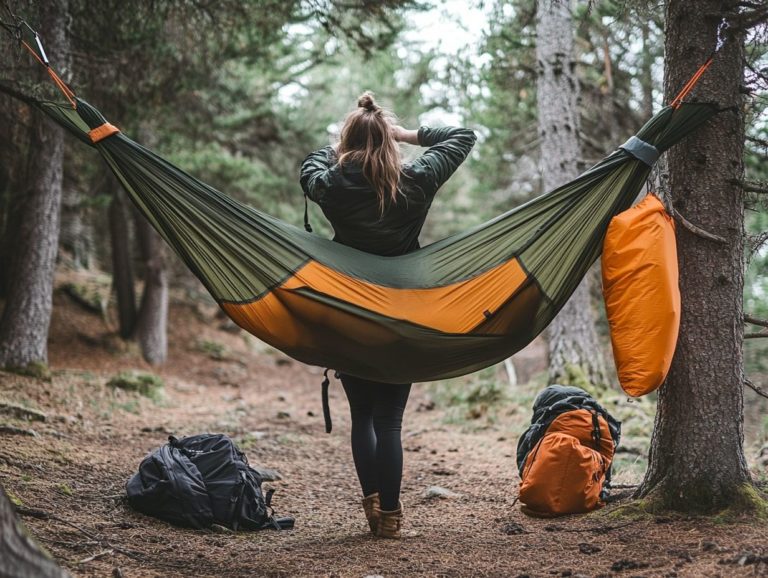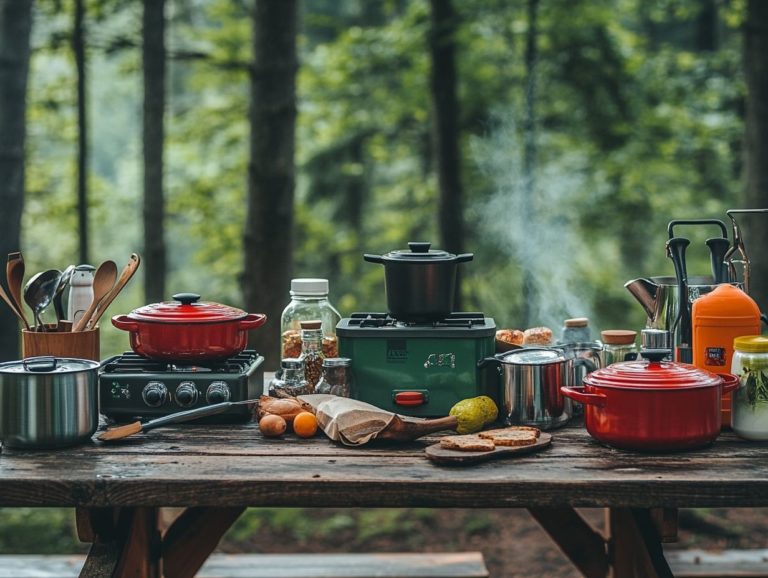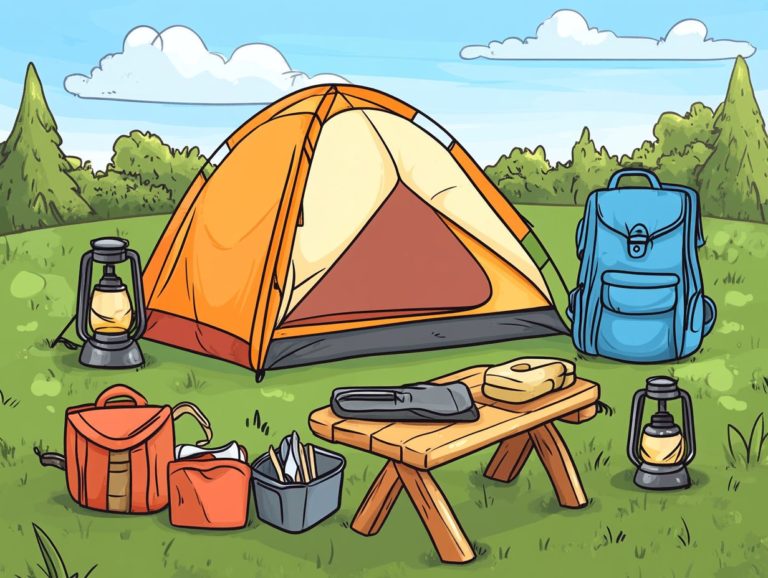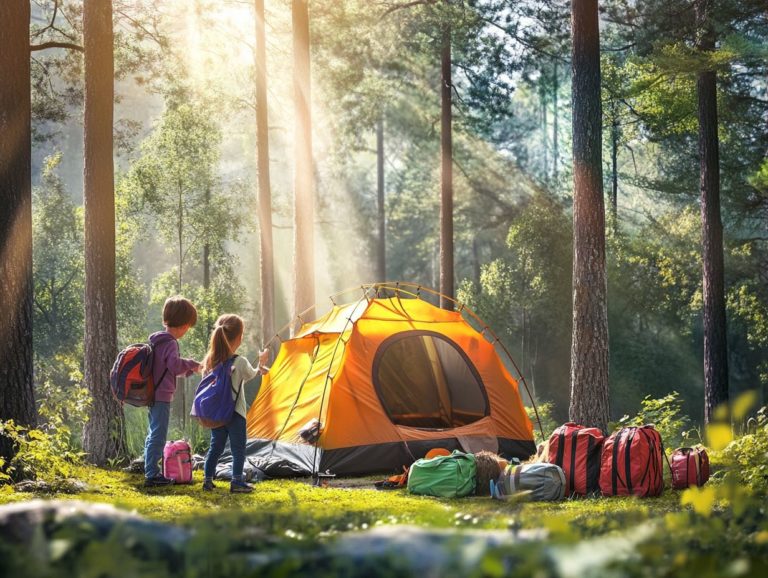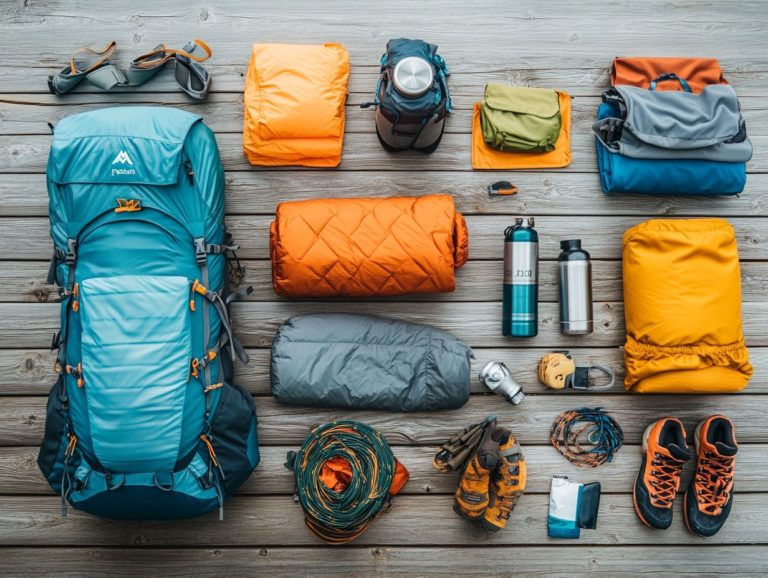What to Do in Case of Camping Emergencies
Camping offers a thrilling opportunity to immerse yourself in nature. However, it also presents unforeseen challenges that can arise at any moment.
To ensure your experience remains safe and enjoyable, being ready for emergencies is crucial.
In this article, you ll discover essential gear and supplies you should have on hand. We ll outline common emergencies you might encounter in the wild and provide fundamental first aid techniques. Additionally, you ll find emergency response procedures and practical tips designed to keep situations from escalating.
Arm yourself with the knowledge necessary to effectively navigate any camping emergency that comes your way!
Contents
Key Takeaways:
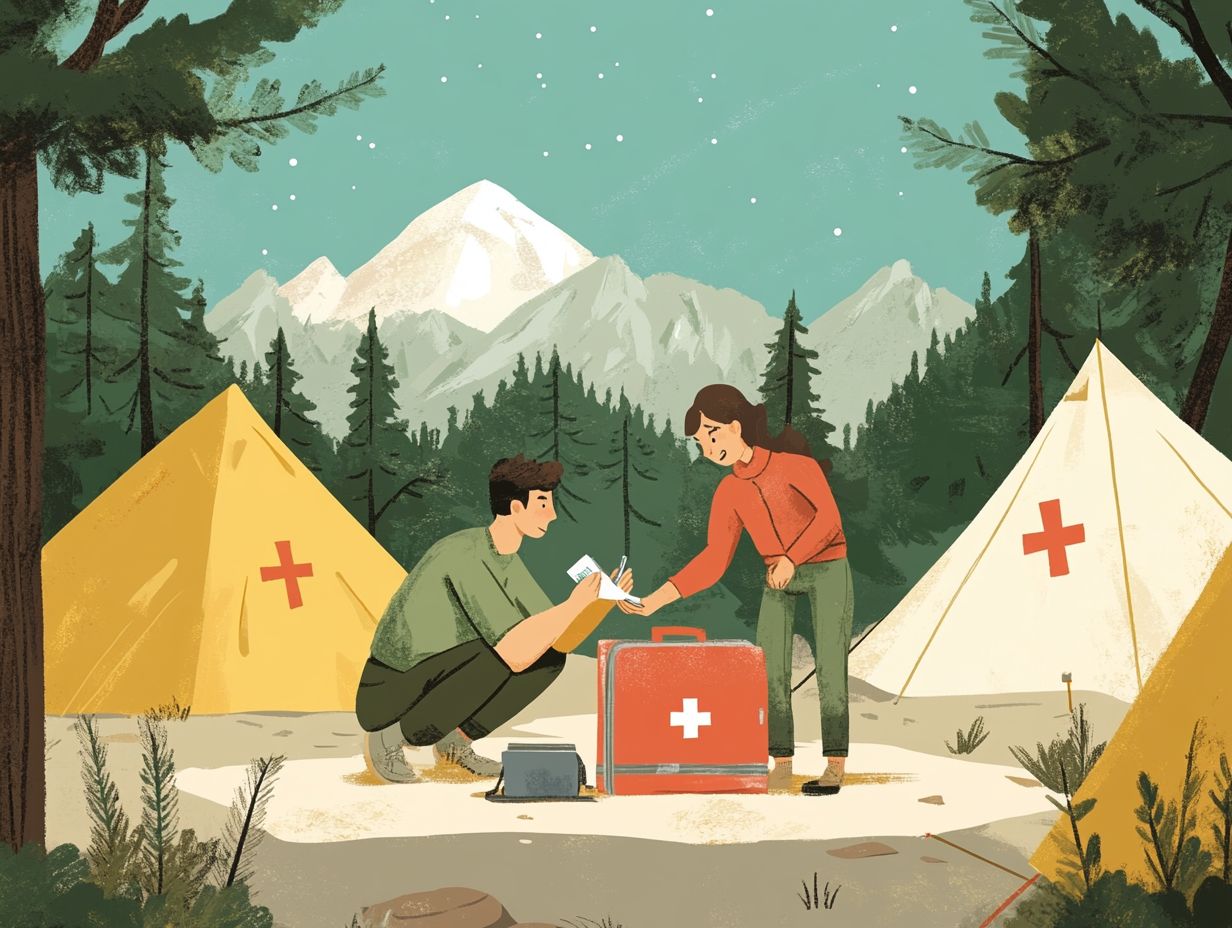
- Always be prepared for camping emergencies by bringing essential gear and supplies such as a first aid kit, flashlights, and emergency contact information.
- Identify common camping emergencies and know basic first aid techniques to minimize their impact.
- Follow proper emergency response and evacuation procedures to ensure safety and seek immediate medical attention if needed.
Preparing for Camping Emergencies
Preparing for camping emergencies is essential for ensuring the safety of all campers and minimizing risks tied to outdoor adventures. Whether you re venturing into California’s breathtaking wilderness or settling in at a local campground, having a comprehensive plan is key.
This means assembling an emergency kit filled with vital supplies. Grasping communication protocols for emergencies and becoming well-acquainted with evacuation procedures specific to your camping location is crucial, especially in case of medical emergencies or wildlife encounters.
Consider weather conditions and potential wildlife encounters as you prepare your strategy.
Essential Gear and Supplies
Essential gear and supplies are the backbone of a successful camping trip, particularly when you consider the potential emergencies that nature can throw your way.
For you as a camper, assessing your specific environment is critical. Your needs can vary dramatically depending on whether you’re nestled in a lush forest, trekking through arid deserts, or navigating frigid mountains.
A reliable water purification system becomes invaluable, especially in areas lacking clean water sources. It ensures you’re hydrated while minimizing the risk of waterborne illnesses.
When facing cold climates, thermal blankets or sleeping bags rated for extreme conditions are essential for preventing hypothermia. In warmer areas, hydration packs and electrolyte tablets are your best allies in combating heat exhaustion.
Each of these items not only enhances your personal safety but also elevates your overall outdoor experience, making it both enjoyable and secure.
Common Camping Emergencies
Common camping emergencies can include a variety of challenges, ranging from medical issues and wildlife encounters to environmental hazards such as heat exhaustion or hypothermia.
Recognizing these potential threats is essential for any outdoor enthusiast, as they can emerge unexpectedly, even during meticulously planned trips.
For example, an allergic reaction to a bee sting or food poisoning from improperly stored provisions can present serious risks at a campground. Thus, it s imperative to understand how to handle these emergencies to ensure a safe and enjoyable camping experience.
Identifying and Addressing Common Emergencies
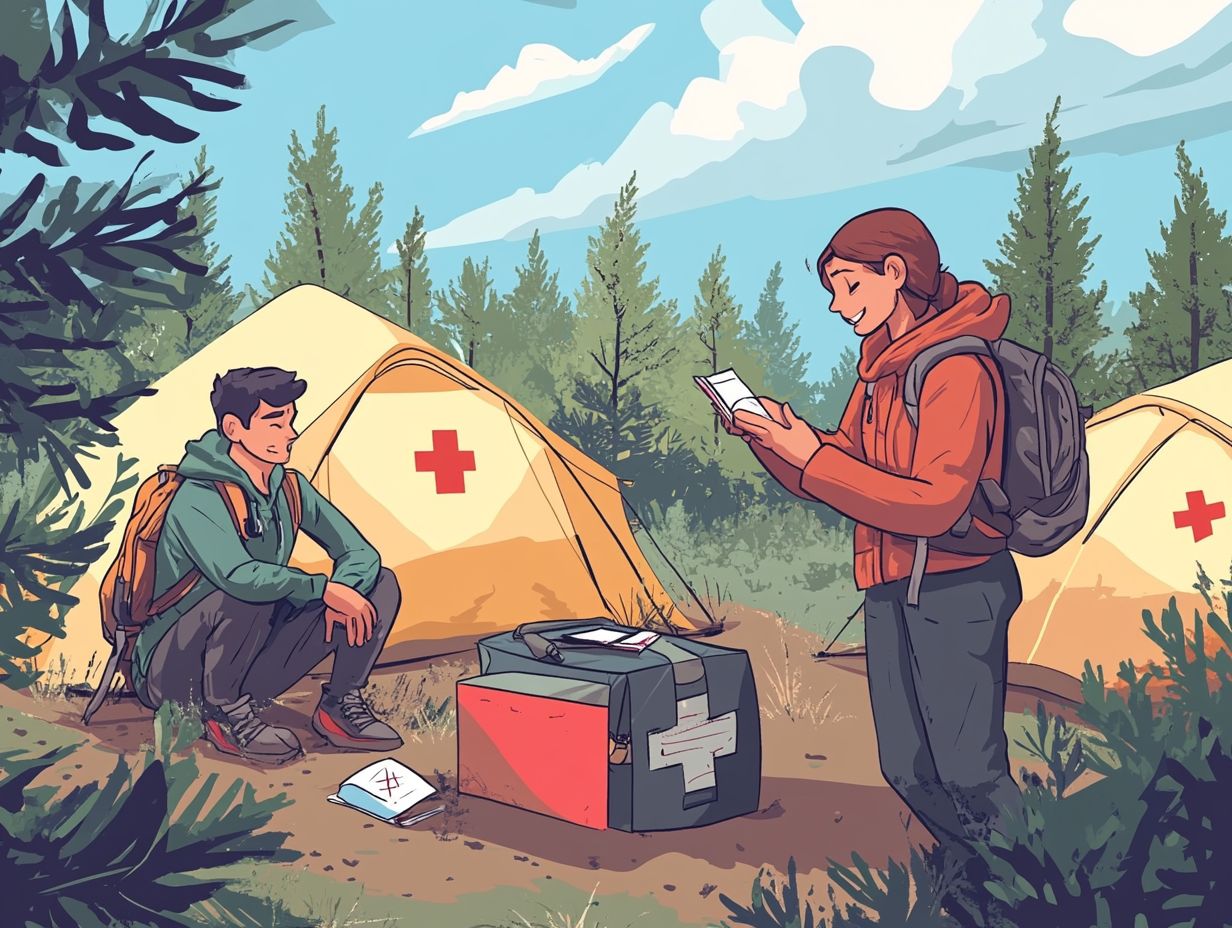
Identifying and addressing common camping emergencies is essential for ensuring your well-being and that of your fellow campers. Recognizing the signs of heat exhaustion like excessive sweating, a rapid pulse, and dizziness can help mitigate risks during sweltering summer days.
It’s equally important to be aware of potential wildlife encounters, whether with bears or other critters. This awareness helps ensure safety while respecting the environment.
Training in basic first aid techniques equips you to respond effectively to medical emergencies. This enhances the overall safety of your camping experience.
Understanding fire safety and mastering the art of properly extinguishing campfires can prevent wildfires that threaten the surrounding area. Familiarizing yourself with symptoms of dehydration, which is when your body loses too much fluid, allows you to take proactive measures by drinking plenty of fluids.
Preparation is crucial! A well-stocked first aid kit can be a game-changer in emergencies. Regularly practicing first aid skills, like cardiopulmonary resuscitation (CPR) or wound treatment, ensures you re ready to act swiftly in emergencies. This is vital for making your outdoor excursions both enjoyable and secure.
First Aid for Camping Emergencies
In terms of camping emergencies, first aid is your best friend. Understanding how to utilize a well-stocked first aid kit effectively is crucial. Also, receiving proper first aid training is equally important.
As you immerse yourself in nature, ensure your first aid kit contains supplies for common issues like blister care, treatment for cuts, and management of allergic reactions. Having medical identification on hand can be a lifesaver in severe allergic scenarios or other medical emergencies.
Being prepared is not just advisable; it s essential for any camper.
Basic First Aid Techniques
Master basic first aid techniques. They can make the difference between a minor issue and a serious emergency. For instance, knowing how to care for blisters properly can prevent infections and keep your outdoor adventures on track.
Understanding how to prevent hypothermia and recognizing the signs of heat exhaustion significantly enhances your camping safety and enjoyment. Equipping yourself with emergency supplies and knowing how to utilize them is vital for addressing these situations effectively.
Familiarizing yourself with the appropriate response to insect bites and allergic reactions can be a game changer. Carrying antihistamines and knowing when to use them can offer immediate relief from mild reactions, ensuring that your adventure continues without interruption.
Knowing how to stabilize a sprained ankle or apply pressure to a bleeding wound enables you to manage injuries efficiently until professional help arrives. These essential skills prepare you for unexpected challenges and foster a sense of confidence that enriches the camping experience.
Handling Severe Emergencies (Including Disaster Preparedness)
Handling severe emergencies while camping demands a meticulously crafted emergency response plan. This ensures that you and your fellow campers are ready to act swiftly and effectively when faced with critical situations.
Familiarizing yourself with the evacuation procedures specific to your campground can be invaluable during emergencies, whether they involve natural disasters or serious medical incidents. Establishing clear communication protocols among all campers enhances coordination, potentially saving lives in those dire moments.
Emergency Response and Evacuation Procedures
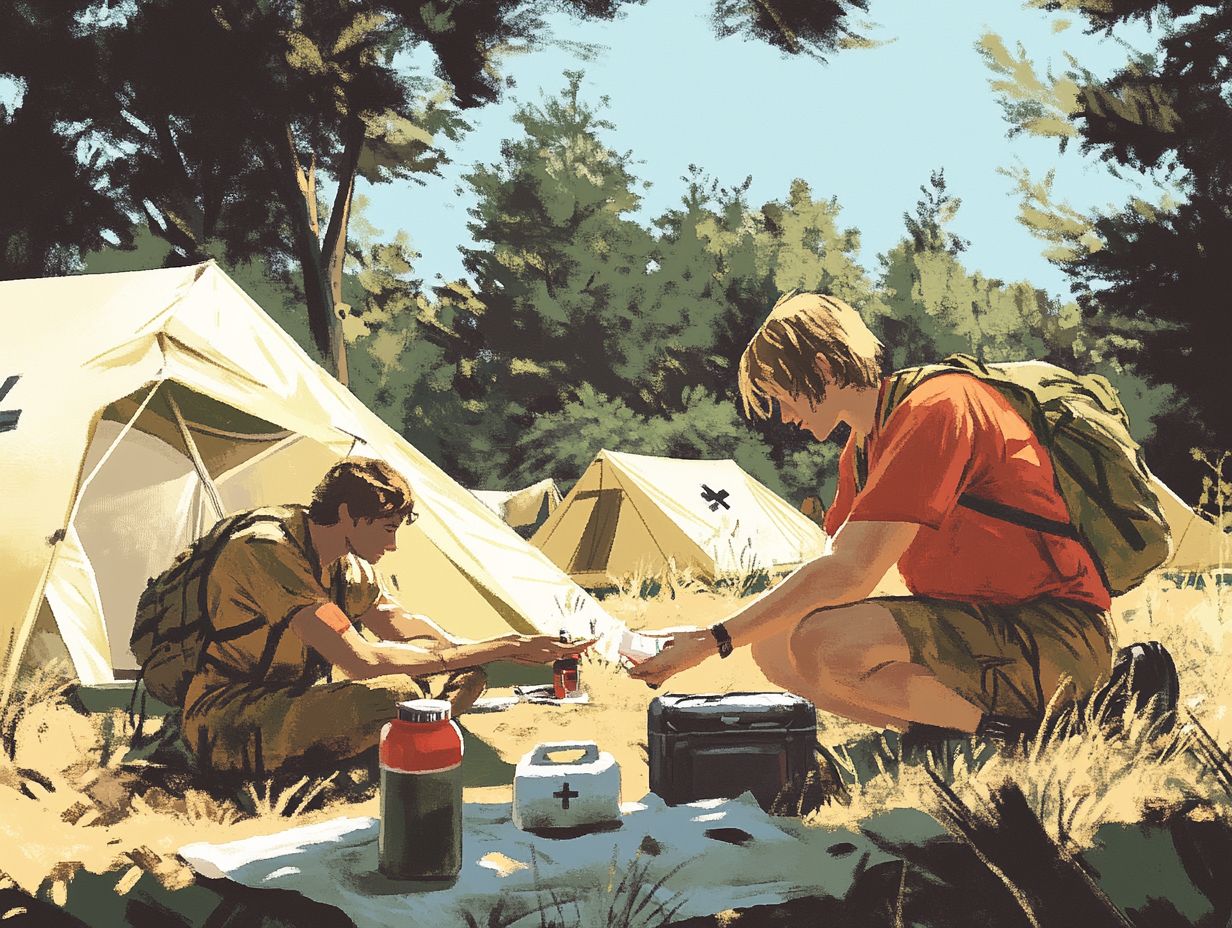
Emergency response and evacuation procedures are vital for camping safety. By recognizing potential threats like wildfires, you can take timely action to enhance your safety.
Establish clear communication protocols. This ensures everyone knows what actions to take during an emergency, fostering preparedness invaluable in high-stress situations.
To further bolster your readiness, familiarize yourself with the specific signs of different emergencies, such as smoke suggesting a possible fire or darkening skies indicating an impending storm. When an emergency arises, remember to follow designated evacuation routes and stay calm while executing your plans.
Practical communication strategies like appointing group leaders to relay information or using walkie-talkies in remote areas can significantly streamline the process. For instance, having a pre-established signal can alert everyone to gather at a safe meeting point, ensuring no camper gets left behind in critical moments. These proactive measures not only promote safety but also foster unity within your group.
Preventing Camping Emergencies
Preventing camping emergencies is essential for a successful outdoor experience. Proper camping tips can greatly reduce risks associated with various hazards. By prioritizing campfire safety, ensuring effective food storage, and recognizing the symptoms of heat exhaustion or hypothermia, you can significantly minimize potential dangers.
Understanding the unique characteristics of your environment whether a mountain campsite in California or a serene wooded area helps you prevent camping emergencies effectively.
Tips for Staying Safe and Avoiding Emergencies
To enjoy the great outdoors safely, key strategies include staying updated on weather conditions and knowing your wildlife encounters. Practicing emergency preparedness will also help create a safer camping environment and significantly elevate your overall outdoor experience.
Familiarize yourself with the terrain you ll navigate. Carry a reliable map and compass or use GPS devices for directional awareness. Ensuring that you have the right gear on hand like first aid kits and communication devices will further bolster your readiness for unexpected situations.
Connecting with fellow campers or local ranger services for up-to-date safety tips can enhance your adventure’s security. Emphasizing these preparatory measures makes a significant difference in enjoying nature’s beauty while minimizing risks.
Frequently Asked Questions
What to Do in Case of Camping Emergencies?
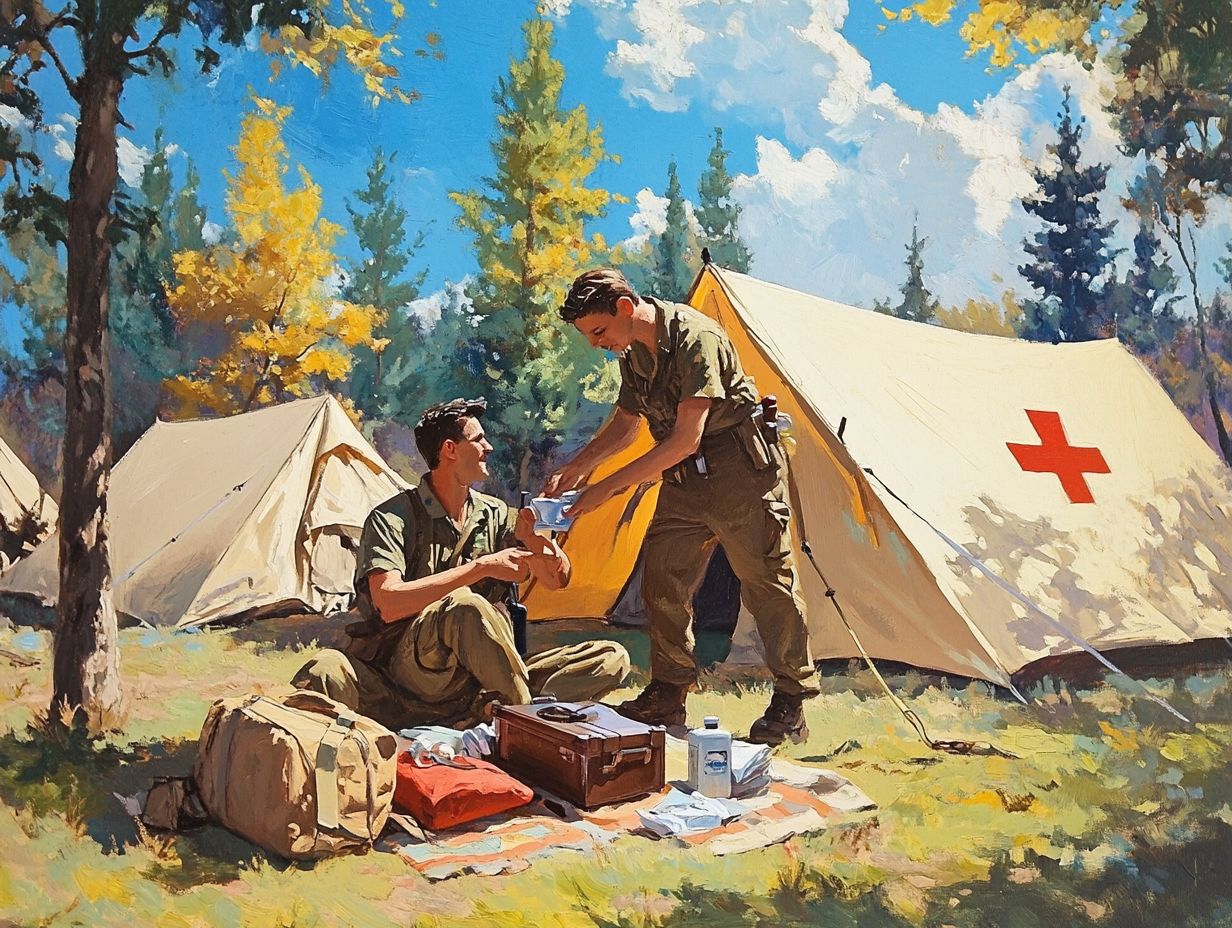
If you find yourself in a camping emergency, stay calm and follow these steps:
What should I do if I get lost while camping?
If you get lost while camping, the first thing to do is stop and stay put. Try to retrace your steps and look for any familiar landmarks. If you are still unable to find your way, use a whistle or other signaling device to attract attention. If you have a map and compass, use them to navigate back to your campsite.
How do I treat a minor injury while camping?
If you have a minor injury while camping, clean the wound with soap and water, and cover it with a sterile bandage. If necessary, take an over-the-counter pain reliever and elevate the injured area. If the injury is more serious or does not improve, seek medical attention immediately.
What should I do if there is severe weather while camping?
Seek shelter immediately when severe weather strikes. Stay away from tall trees, open fields, and water.
If you re in a tent, ensure it s securely staked and take cover inside. Always follow instructions from park rangers or campsite staff.
What if I encounter wildlife while camping?
Stay calm and slowly back away from the animal. Do not run or make sudden movements.
If the animal seems aggressive, make yourself appear larger and make loud noises. Never approach or feed wild animals!
What should I do if I have a medical emergency while camping?
In a medical emergency, act fast! Call for help right away!
If you re in a remote area, use a satellite phone. If not, make noise with a whistle or reflect sunlight with a mirror to get attention.
If you have cell service, call 911 for emergency assistance. Keep someone with you while another person seeks help.

